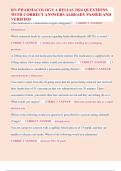Summary
Summary Edexcel Politics A-level - Paper 2 UK Government: A* Essay Plans
- Module
- Paper 2: UK Government
- Institution
- PEARSON (PEARSON)
Over 30 detailed essay plans - with many examples - I used to revise for Edexcel Politics Paper 2 in 2023, which I got an A*. Covers spec topics, including questions I predicted could come up in the future as they hadn’t yet.
[Show more]












